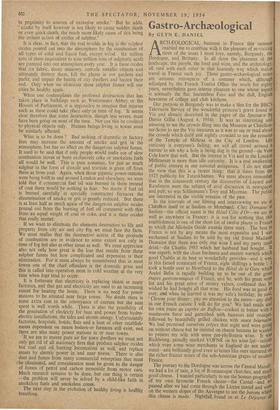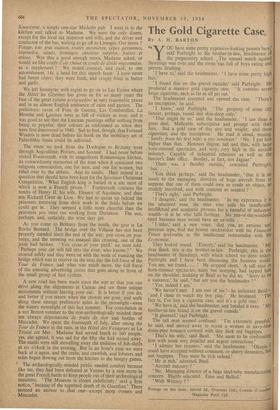Gastro-Archaeological
By GLYN E. DANIEL RCH/EOLOGICAL business in France this summer enabled me to combine with it the pleasure of re-visiting three of the areas I most love, namely, Burgundy, the Dordogne, and Brittany. In all three the pleasures of the landscape, the people, the food and wine, and the archwology, all vied with each other in that heavenly way which makes travel in France such joy. These gastro-archwological notes are autumn retrospects of a summer which, although adjudged by the French Tourist Office the work for eighty years, nevertheless gave intense pleasure to one whose aspect is normally the flat, featureless Fens and the dull, English heaviness of college and club kitchens. Our purpose in Burgundy was to make a film for the BBC's Television Service of the wonderful princess's grave found at Vix and already described in the pages of the Spectator by Darsie Gillie (August 6, 1954). It was as interesting and amusing to see the crowds filing into the Museum at Chatillon• sur-Seine to see the Vix treasures as it was to see or read about the crowds which daily and nightly crowded to see the remains of the Temple of Mithras in the City of London. Idle curiosity is everyone's failing; we will all crowd around a barrier to see why a hole is being dug in the ground—de Vero Cole knew that well. But the interest in Vix and in the London Mithraeum is more than idle curiosity. It is a real awakening of public interest in our national antiquities. I do not share the view that this is a recent thing: that it dates from the 1923 publicity for Tutankhamen. We must always remember that in the nineteenth century the discoveries of Layard and Rawlinson were the subject of avid discussion in newspaper and pub; so was Schliemann's Troy and Mycenae. The public are interested in the visible remains of the past. In the intervals of our filming and interviewing we ate al Chatilion itself or at Saulieu or Montbard, Chez Dinnaine at Saulieu—the official name is the Hotel Cote d'Or—we ate as well as anywhere in France: it is not for nothing that this establishment is one of the short list of twelve places in Franco to which the Michelin, Guide awards three stars. The best is France is not by any means the most expensive and I was enchanted at Saulieu to be told by my old friend Madame Dumaine that there was only one wine I and my party must drink—the Chablis 1953 which her husband had bought. It was superb, with the clean freshness and mature warmth which good Chablis at its best so wonderfully provides—and it was, in this famed restaurant of France, eight shillings a bottle ! took a bottle over to Montbard to the Hord de la Care whicb Andre Belin is rapidly building up to be one of the great Mapes gastronomiques of France, and he, with his great wine list and his great sense of money values, confessed that he wished he had bought all that wine. His food was as good as ever, and when he learned it was my wife's birthday, he said. Choose your dinner: pay no attention to the menu—any dish, in our French cuisine will do for you.' We had' snails and his own truite au caprice de Buff on—cooked in butter with $ mushroom farce and garnished with bananas and oranges. followed by beautifully grilled chicken with sauce bearnaise. We had promised ourselves crepes that night and were going on_without cheese but he insisted on cheese because he wanted to present my wife with some pre-phylloxera wine. It was Richbourg; proudly marked VOFNR on his wine Ijst—initials which even some wine merchants in England do not under' stand—and brilliantly good even to'tastes like ours nurtured on the richer fruitier wines of the sub-American grapes of modal France. Sousceyrac, a simple one-star Michelin pub. I went in to the kitchen and talked to Madame. We were the only diners, except for the local tax inspector and wife, And the driver and conductor of the bus, waiting to go off to Limoges. Our menu ? Potage, foie Bras maison, truites nzeunieres, copes paysatines, tournedos, salade, frontages, omelette surprise, (raises et creme. Was this a good enough menu, Madame asked, or would we like confit d'oie chaud or confit de dinde mayonnaise, as a supplement ? We rested content, and paid, to our astonishment. 14s. a head for this superb feast. 1 have never had better copes; they were fresh, and crisply fried in butter and garlic.
We left Souseyrac with regret to go on to Les Eyzies where the Hotel les Glycines has given us for so many years the best of the great cuisine j)erigourdine at very reasonable prices and in an almost English ambience of calm and garden. The prehistoric caves of Font de Gaume, Les Combarelles, La Mouthe and Itascaux were as full of visitors as ever, and it was good to sec that the Lascaux paintings suffer nothing from being so popular, their colours as undimmed as when they were first discovered in 1940. Sad to find, though, that Fernand Windels is now dead before his book on the mobiliary art of Palaeolithic times could be achieved. • The route we took from the Dordogne to Brittany went through AngoulC.,'Ine, Poitiers, and Saumur. I had never before visited Fontevrault, with its magnificent Romanesque kitchen, its extraordinary memories of the time when it contained two religious, communities, one for men, and one for women, but ruled over by the abbess. And its tombs. Here indeed is a question that should have been kept for the Spectator Christmas Competition, ' What English king is buried in a site most of which is now a French prison ? ' Fontevrault contains the tombs of Henry II, his wife, Eleanor of Aquitaine. and their son Richard Coeur de Lion. We had to queue up behind the prisoners returning from their work in the fields before we could get in. They seemed a little more cheerful than the prisoners you meet out working from Dartmoor. The sun, perhaps, and, certainly, the wine they get.
As you come to Brittany from the south, the gate is La Roche Bernard. The bridge over the Villaine has not been properly mended sincc.the end of the war: you cross on pon- tool's, and the morning we essayed this crossing, one of the joins had • broken. You cross at your peril,' we were told. ' Perhaps your gar will fall into the river, who knows ? ' We crossed safely and they went on with the work of mending the bridge which was to receive on the next day the full force of the Tour de France, and what was much more, the full 'force of the amusing, advertising circus that goes along in front of the small group of fast cyclists.











































































 Previous page
Previous page